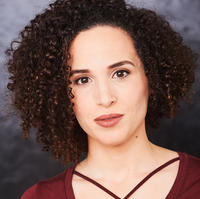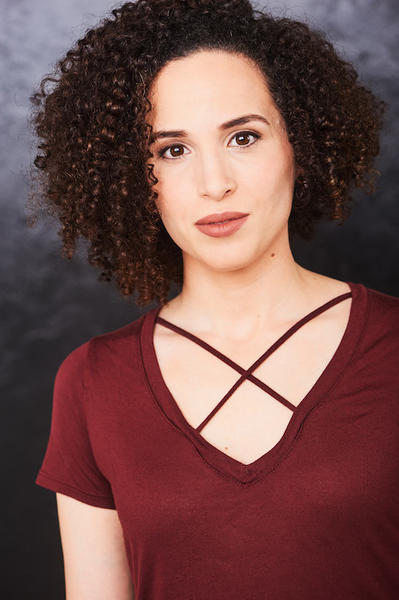 Adriana Colón '12 says artists are scavengers, always asking "What can I make from this?" She will be on campus coaching the cast of West Side Story on performance technique, cultural sensitivity and representation.
Adriana Colón '12 says artists are scavengers, always asking "What can I make from this?" She will be on campus coaching the cast of West Side Story on performance technique, cultural sensitivity and representation.
By Vicki Xu '23
Adriana Colón ’12 is a triple threat: She is a voice actor (in two languages: Spanish and English); she acts on stage; she directs. Most important, her work centers on exploring the role of the body in performance.

Found spaces greatly influenced Colón’s work at Harvard, where she acted and directed in TEATRO, Harvard-Radcliffe Dramatic Club and the Harvard Early Music Society. The ritual of theater — how people engage with each other on the stage and in the audience, and the stories people tell about their physical experiences — fascinated her. As a Mellon Mays Undergraduate Fellow, she spent her junior year summer at Double Edge Theatre, a laboratory theater on a Massachusetts farm, and the experience inspired her to craft her own concentration Performance and the Body. Performed in 2012, which coincided with the Mayan calendar apocalypse scare, her thesis worked off the doomsday obsession at the time and at the end posed a moral dilemma that audience members were forced to physically engage with.
“It was powerful to see the way people reacted,” says Colón. “Something I’m really passionate about is agency, the feeling that we have power in the stories we tell. At the end of the day, it felt like a successful experiment. At the same time, it got some real pushback from people, which was very exciting, but made me question, ‘Man, do I want to do this after college?’”
After graduating from Harvard, Colón was still undecided about what particular path in the arts she wanted to take. She interned for a production company and worked as an assistant to a Broadway writer for a while but realized she would rather put organizational energy into her own work. Incidentally, she had just bought a microphone to do sound design for a theater piece, and on a whim she began making voiceovers. This segued into voice acting, and today her portfolio includes video game narration, children’s e-learning lessons and audiobook reading.
“Artists are scavengers,” she says. “It’s like, ‘What can I make from this?’ There’s also a sense of pushing your own boundaries to get people’s buttons. If you get people by their virtues then you really get to what matters to them.”
Colón cites maintaining mental health as one of the essential aspects to functioning as an artist. “We can be so hard on ourselves because we have so much potential,” she says. “But the entertainment industry is a long haul, and what keeps you sane is that ability to go back to your sense of satisfaction, your sense of beauty, and all these things.” To this end, she meditates daily — or as much as she can — to ground herself in the present. Art, she says, comes “back to being in touch with yourself and what resonates with you.”
As she continues to meld theater with social responsibility, Colón will be visiting Harvard October 25 to November 3 as a resident artist to work with the cast and crew of West Side Story on the artistic expression of the musical as well as its cultural sensitivity. She will also be hosting a discussion with with Adriana Gutiérrez, Senior Preceptor in Spanish at the Department of Romance Languages and Literatures, producer Amanda Gonzalez-Piloto '21 and the cast of West Side Story, about the cultural legacy of West Side Story 5-6 p.m. November 1 at Farkas Hall. This event is free and open to the public.
“I’m a big fan of new work and adaptations because I feel that the cultural conversation is always evolving,” she says, “and it’s important to craft something that’s not only for this moment, but this audience and these performers as well.”
As for her thoughts on art in general? “The stories we tell, they have the potential to break barriers and perpetuate certain ideas. As long as we view artmaking as a conversation, we’re in a good place.”